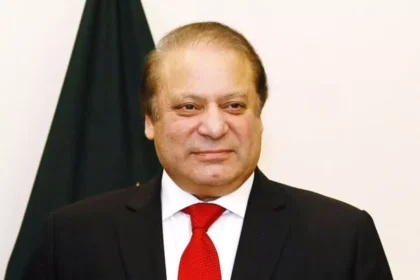Introduction
In an unexpected yet highly significant meeting, Indian journalist Barkha Dutt recently met with former Prime Minister of Pakistan Nawaz Sharif and his daughter Maryam Nawaz in Lahore. The meeting comes at a critical juncture for Pakistan’s political future, as the country gears up for its general elections, and Nawaz Sharif plans his return to the political landscape after a period of exile. This meeting, particularly with Dutt, a renowned journalist with a vast history of covering South Asian politics, has sparked intense speculation across both India and Pakistan. While the details of the conversation have been kept confidential, the symbolism of the encounter has profound implications not just for Pakistan’s domestic politics but also for the broader Indo-Pakistani relations.
Nawaz Sharif and Maryam Nawaz, who represent the Pakistan Muslim League-Nawaz (PML-N), are critical figures in Pakistan’s political sphere. Their meeting with Barkha Dutt raises several questions regarding the motives behind the dialogue and its potential impact on the political dynamics of the region. This article delves into the meeting’s significance, examining the domestic and international dimensions of this political dialogue.
The Political Climate in Pakistan
To fully understand the significance of this meeting, it is essential to contextualize Pakistan’s current political situation. The country is approaching general elections amidst political instability, public discontent, and economic challenges. Nawaz Sharif, once ousted from his Prime Ministerial role in 2017 after a Supreme Court ruling due to corruption charges, has been residing in London, with Maryam Nawaz stepping into the limelight and keeping the PML-N party strong during his absence.
Pakistan’s political landscape is highly fragmented, with the current ruling government facing immense challenges in maintaining political and economic stability. The return of Nawaz Sharif ahead of the elections is seen as a potential game-changer, as his leadership has historically played a pivotal role in shaping Pakistan’s political direction. This meeting with Barkha Dutt, who has reported extensively on Indo-Pak relations, adds another layer of intrigue to an already tense political atmosphere.
Barkha Dutt’s Influence on South Asian Politics
Barkha Dutt is not just any journalist. With decades of experience reporting on South Asian geopolitics, especially the tumultuous relations between India and Pakistan, Dutt’s coverage has often shaped public opinion and even political dialogue between the two countries. As a figure known for navigating complex political landscapes, her meeting with the Sharifs is a significant diplomatic event. While Dutt has not directly been involved in political negotiations, her role as a media personality often intersects with the political and diplomatic dialogue in the region.
The fact that Dutt chose to meet Nawaz Sharif and Maryam Nawaz at this crucial moment suggests that she might be attempting to bridge political divides or, at the very least, gain insights into Pakistan’s evolving political dynamics. As someone deeply familiar with Indo-Pakistani issues, Dutt’s perspectives could also influence how the Indian media and political circles view Nawaz Sharif’s return to Pakistani politics and Maryam Nawaz’s rising political influence.
The Sharifs’ Political Strategy
For Nawaz Sharif and Maryam Nawaz, the timing of this meeting is equally crucial. Nawaz Sharif’s political comeback hinges on rebuilding his image and securing the PML-N’s position in the upcoming elections. The party, which has historically enjoyed strong support from Punjab, Pakistan’s largest and most politically significant province, needs to rally voters ahead of a tough election.
Maryam Nawaz has been at the forefront of the party’s electoral campaign, continuing her father’s legacy while carving out her own political path. However, Nawaz Sharif’s return is expected to solidify the party’s leadership, bringing unity and strength to the PML-N’s efforts. Meeting with a prominent Indian journalist like Barkha Dutt could also help the Sharifs reach out to international audiences and reshape the narrative surrounding Nawaz Sharif’s legal battles, his exile, and his political future.
This meeting could be seen as an attempt to garner positive international media attention, positioning Nawaz Sharif as a seasoned statesman ready to take the helm once again and navigate Pakistan through its current political and economic crises.
Indo-Pak Relations in the Context of the Meeting
While the meeting is primarily seen as a domestic political event for Pakistan, it also holds importance for Indo-Pakistani relations. Nawaz Sharif has been a proponent of improving ties between India and Pakistan, advocating for peace and cooperation during his time in office. However, the relationship between the two nuclear-armed neighbors has been fraught with conflict, particularly in recent years, as both nations grapple with territorial disputes, border tensions, and political rhetoric.
Barkha Dutt’s meeting with Sharif could symbolize an attempt to open channels of dialogue through less formal means. Media figures often play an influential role in shaping the narrative between countries, and Dutt’s presence in Lahore signals a willingness on both sides to maintain some level of engagement. Even if the meeting does not lead to direct diplomatic actions, it could foster goodwill and pave the way for more conversations about Indo-Pak relations in the future.
Media’s Role in Shaping Political Dialogue
The involvement of journalists in political discourse has always been a sensitive issue in South Asia. In Pakistan, where media freedom has been under scrutiny in recent years, the role of journalism in shaping public opinion and political outcomes cannot be underestimated. In India, where the media plays a central role in shaping foreign policy narratives, journalists like Barkha Dutt wield considerable influence in how political figures and movements are perceived.
This meeting underscores the power of media in shaping both domestic and international political dialogue. The presence of a prominent Indian journalist at a crucial time in Pakistani politics highlights the growing interconnectedness between media and politics in South Asia. It also suggests that political figures recognize the importance of media engagement in crafting their narratives and reaching broader audiences beyond their national borders.
Potential Outcomes of the Meeting
While it is too early to predict the exact outcomes of the meeting, the interaction between Barkha Dutt, Nawaz Sharif, and Maryam Nawaz could have several implications. Domestically, it could bolster Nawaz Sharif’s image as an experienced leader ready to return to the political arena, while internationally, it might reshape how foreign media views his political future.
For Maryam Nawaz, the meeting is another opportunity to solidify her position within Pakistan’s political hierarchy, signaling her readiness to lead alongside her father. The Sharifs will likely use this meeting to their advantage, leveraging the international media attention to project themselves as Pakistan’s most viable political leaders.
From a geopolitical perspective, this meeting could encourage further conversations about Indo-Pakistani relations, especially as both nations approach critical electoral periods. While it is unlikely to lead to immediate diplomatic breakthroughs, the meeting demonstrates the potential for media and political figures to contribute to the ongoing dialogue between India and Pakistan.
Barkha Dutt’s meeting with Nawaz Sharif and Maryam Nawaz is more than just a media interaction; it is a reflection of the intricate relationship between politics and journalism in South Asia. The timing of the meeting, as Pakistan navigates political instability and India prepares for its own elections, highlights the broader implications for both countries. As Nawaz Sharif returns to Pakistan’s political landscape and Maryam Nawaz continues to strengthen her leadership role, the meeting with Barkha Dutt serves as a strategic move that could shape both domestic politics and international perceptions of the Sharifs. Only time will tell what impact this meeting will have on Pakistan’s political future and Indo-Pakistani relations, but for now, it stands as a pivotal moment in the ongoing political discourse of the region.
#BarkhaDutt #NawazSharif #MaryamNawaz #PakistanPolitics #IndoPakRelations #SouthAsia #Journalism #PoliticalDialogue #Diplomacy #PMLN #MediaInfluence #IndiaPakistan #Election2024







